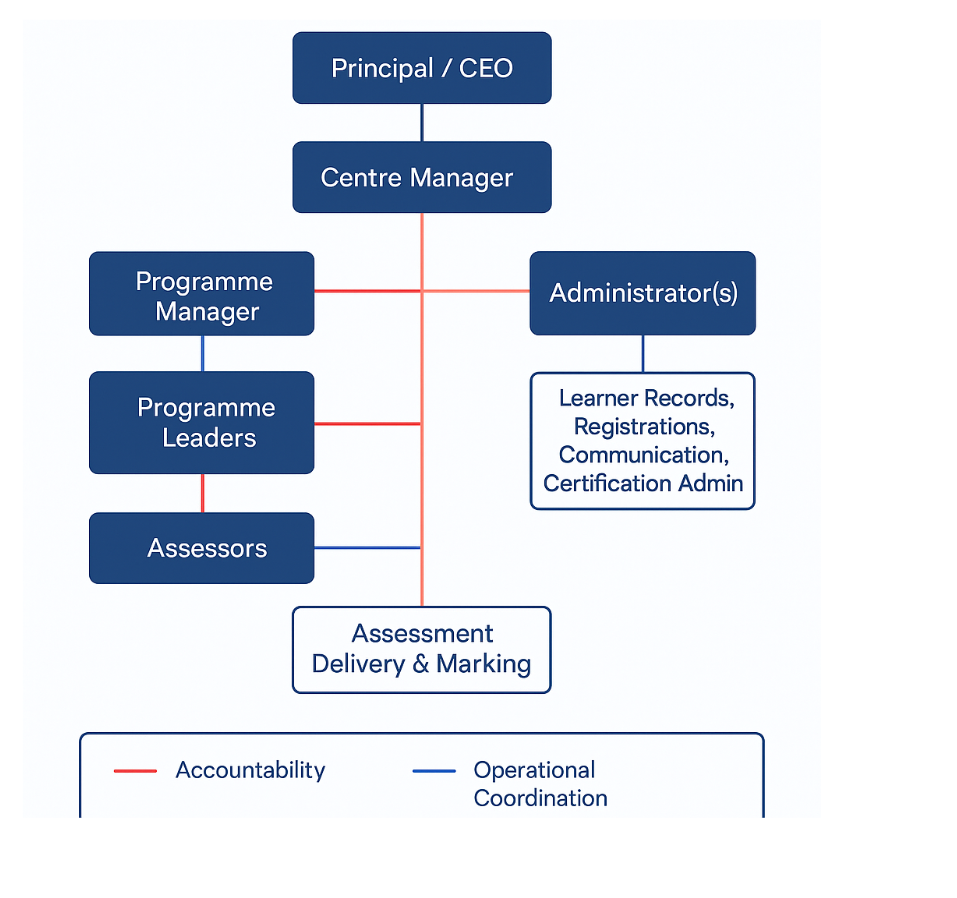Type at least 2 characters to see results
Type at least 2 characters to see results
Subscribe to get the latest updates and offers.
© 2025 FSoB
All rights reserved.






“Any deliberate action, negligence, default, or practice that undermines the integrity of the assessment process and/or compromises the validity of certificates.”This definition extends to misconduct and instances of bias or discrimination against particular learner groups. It may also involve failures in record-keeping or intentional falsification of assessment records to obtain certification fraudulently.
| Statement | Strongly Agree | Agree | Neutral | Disagree | Strongly Disagree |
|---|---|---|---|---|---|
| The tutor explains concepts clearly. | |||||
| Teaching methods are engaging and inclusive. | |||||
| The pace of the course is appropriate. | |||||
| The tutor encourages participation and discussion. | |||||
| The learning materials are clear and helpful. |
| Statement | Strongly Agree | Agree | Neutral | Disagree | Strongly Disagree |
|---|---|---|---|---|---|
| I understand the assessment criteria. | |||||
| The assessments are fair and relevant. | |||||
| I received timely feedback on assignments. | |||||
| The feedback helps me improve my performance. |
| Statement | Strongly Agree | Agree | Neutral | Disagree | Strongly Disagree |
|---|---|---|---|---|---|
| I know where to access academic support. | |||||
| Digital and learning resources are easily accessible. | |||||
| The virtual learning environment (VLE) is user-friendly. | |||||
| I feel supported by the programme team. |
| Statement | Strongly Agree | Agree | Neutral | Disagree | Strongly Disagree |
|---|---|---|---|---|---|
| I am satisfied with the quality of this module/course. | |||||
| My views are respected by tutors and staff. | |||||
| I would recommend this course to others. |
| Area | Expectation |
|---|---|
| Engagement | Log into the VLE at least 3 times per week |
| Communication | Check messages regularly and respond promptly |
| Attendance | Attend live sessions or watch recordings as required |
| Academic Integrity | Submit original, independent work |
| Submission | Meet all deadlines using the online system |
| Technical Readiness | Have reliable internet and an appropriate device |
| Scenario | Conflict Type |
|---|---|
| A student is assessed by a tutor who is a relative or close associate | Academic |
| A student receives external help on an assignment from someone involved in their programme | Academic Integrity |
| A student’s employer directly influences their coursework submissions | Professional/Academic |
| A student impersonates another student in an exam or submits work on their behalf | Ethical Breach |
| A student participates in internal quality assurance or moderation activities | Procedural Conflict |
| Responsibility | Expectation |
|---|---|
| Awareness | Understand this policy and how it applies to their circumstances |
| Integrity | Declare any conflict truthfully and promptly |
| Engagement | Cooperate with FSOB in resolving declared conflicts |
| Academic Honesty | Uphold the standards of independent work, fair submission, and ethical conduct |
Effective Date: 23 March 2025
Review Cycle: Annual
Website: www.fsob.co.uk
Email: finance@fsob.co.uk
This Refund Policy outlines the circumstances under which students enrolled in online programmes at Footprint School of Business (FSoB) may be eligible for a refund. It ensures transparency and fairness in financial dealings between the institution and learners studying from any global location.
This policy applies to all online students enrolled in:
| Scenario | Refund Entitlement |
|---|---|
| Withdrawal before course start date | 100% refund (minus non-refundable registration/admin fees) |
| Withdrawal after course start | No refund |
| Course cancelled by FSoB or awarding body | Full refund or alternative placement offered |
| Exceptional personal circumstances (e.g., bereavement, illness) | Considered on a case-by-case basis with supporting evidence |
The following are non-refundable under any circumstances:
All refund applications are handled in accordance with UK GDPR. Financial and personal information will be securely stored and accessible only to relevant staff.
For all refund-related enquiries or submissions, please contact: finance@fsob.co.uk
| Field | Response |
|---|---|
| Full Name | |
| Student ID Number | |
| Programme Title | |
| Level of Study (3, 4, 5, 6) | |
| Module(s) Affected (if any) | |
| Tutor(s) Involved (if any) | |
| Date of Submission |
………………………………………………………………………………………………… ………………………………………………………………………………………………… ………………………………………………………………………………………………… ………………………………………………………………………………………………… ………………………………………………………………………………………………… ………………………………………………………………………………………………… ………………………………………………………………………………………………… …………………………………………………………………………………………………
………………………………………………………………………………………………… ………………………………………………………………………………………………… ………………………………………………………………………………………………… ………………………………………………………………………………………………… ………………………………………………………………………………………………… ………………………………………………………………………………………………… …………………………………………………………………………………………………
| Field | Response |
|---|---|
| Date Received | |
| Assessed By Centre Manager | |
| Action Required | Yes No |
| Referred to Academic Quality Panel | Yes No |
| Resolution Summary | |
| Final Decision Authorised By | |
| Decision Date |
Footprint School of Business (FSOB)
Website: www.fsob.co.uk
Policy Review Date: 21/03/2025
Next Review Date: 20/03/2026
Footprint School of Business (FSOB) is committed to providing fair, transparent, and equal access to assessment and learning opportunities for all candidates. This policy outlines how FSOB ensures that all learners can access the qualifications and assessments offered, regardless of personal characteristics, background, or additional needs.
This policy applies to all learners, staff, tutors, assessors, and administrative personnel involved in the delivery, support, and assessment of qualifications at FSOB. It covers:
For any questions or requests related to access arrangements, please contact:
Email: quality@fsob.co.uk
Phone: +44 (0)7386 767 578
Website: www.fsob.co.uk
Policy Review Date: 21/03/2025
Next Review Date: 20/03/2026
Version: 1.0
Approved by: Academic Quality Committee
This policy outlines the approach FSOB takes to Centre Assessment Standards Scrutiny (CASS) and moderation activities. It ensures that all internal assessments are fair, consistent, and meet the required national standards as defined by awarding bodies and Ofqual. The strategy also aims to identify, address, and prevent potential risks to assessment integrity and learner outcomes.
This policy applies to:
FSOB’s CASS Strategy aims to:
FSOB identifies and manages risks to assessment credibility by:
This policy will be reviewed annually or sooner if needed due to changes in regulations or operations. Revisions will be approved by the Academic Quality Committee.
Signed:
Academic Director
Footprint School of Business
Date: 21/03/2025
Footprint School of Business (FSOB)
www.fsob.co.uk
Effective Date: 21 March 2025
Next Review Date: 20 March 2026
Footprint School of Business (FSOB) is committed to the highest standards of integrity, transparency, and accountability. This Whistleblowing Policy is designed to encourage and enable staff, students, contractors, and other stakeholders to raise concerns about wrongdoing in the workplace without fear of victimisation, harassment, or retaliation.
This policy applies to:
It covers concerns that are in the public interest, including (but not limited to):
This policy is not intended to replace:
Concerns should be raised at the earliest opportunity using one of the following methods:
Email:
admin@fsob.co.uk
Post:
Private & Confidential
Whistleblowing
Centre Manager
Footprint School of Business
20 Wenlock Road, London, N1 7GU
Phone (for urgent concerns):
+44 (0)7386 767578
Whistleblowers may choose to remain anonymous, but anonymity may limit the scope of an investigation.
Upon receiving a whistleblowing report:
All investigations will be conducted in accordance with due process and confidentiality.
In accordance with the Public Interest Disclosure Act 1998 (PIDA), FSOB will not tolerate harassment, victimisation, or unfair treatment of anyone who raises a concern in good faith.
Any staff member found to have retaliated against a whistleblower may face disciplinary action, up to and including dismissal.
If an individual is found to have deliberately made a false or malicious allegation, this will be treated as a serious disciplinary offence and may result in disciplinary action.
If a whistleblower feels FSOB has not addressed their concern appropriately, they may escalate it to relevant external bodies such as:
This policy will be reviewed annually or as required in response to legal, regulatory, or organisational changes. The Centre Manager is responsible for ensuring that all staff are aware of and trained on the whistleblowing procedure.
Approved by:
FSOB Senior Leadership Team
Date: 21 March 2025
Footprint School of Business (FSOB)
www.fsob.co.uk
Welcome to the Footprint School of Business (FSOB). This handbook provides you with
essential information about your role, our systems, and the ways we support one another to
deliver high-quality education.
FSOB is a fully online provider delivering programmes in Business, Health & Social Care,
Digital Technologies at Levels 3 to 6. We are committed to providing accessible, inclusive, and
high-standard education through qualified staff, strong digital systems, and robust internal
processes.
Effective communication is vital to how we operate as a distributed team. FSOB has set up multiple systems to ensure that all staff stay connected and informed:
To maintain quality and alignment across programmes, FSOB schedules the following collaborative activities:
All new staff undergo a structured induction process that includes:
FSOB operates with a competent and qualified team distributed across the UK. All teaching
and assessment are delivered remotely.
All academic staff are qualified to teach and assess at least one level above their delivery level
and are supported with ongoing CPD.
FSOB is a 100% online centre. We use the following platforms to deliver teaching, assessment, and support:
FSOB takes digital safeguarding seriously and maintains a clear framework to protect learners and staff in the online space:
To ensure sustainable and high-quality delivery:
All FSOB staff are expected to:
If you need support, please contact:
Thank you for your continued commitment to learner success and educational excellence. We are pleased to have you as part of our FSOB academic community.
Welcome to the Footprint School of Business (FSOB). This Centre Manual is designed to consolidate key information from our Student and Staff Handbooks into one reference guide for all stakeholders.
FSOB is a UK-based centre accredited to deliver Ofqual-regulated qualifications in Business, Health & Social Care, and Digital Technologies via an accredited awarding organisation. We offer accessible and inclusive online education designed for school leavers, mature learners, and professionals.
FSOB delivers all programmes 100% online using our Virtual Learning Environment (VLE) hosted at www.fsob.co.uk. Key digital tools include TutorPro (LMS), Microsoft Teams, and SharePoint.
Students register through the online portal. Once registered and payment is received, login details are provided. Support is available at admin@fsob.co.uk.
All qualifications align with the RQF and are delivered with flexibility to accommodate different learner needs. Assessment includes written assignments, presentations, and reports.
Assessments are criterion-referenced and feedback is constructive and developmental.
Grades: Pass, Merit, Distinction.
Support services include tutorials, academic coaching, technical support, and wellbeing resources.
Weekly bulletins, Microsoft Teams, Zoom, and SharePoint facilitate communication. Academic issues are logged using digital forms and escalated to the Quality Lead or Centre Manager.
Includes monthly meetings, quarterly standardisation workshops, termly CPD, and an annual appraisal and development plan.
FSOB ensures all learners and staff are trained in digital safeguarding. Issues are reported to the Safeguarding Officer.
A robust IQA system includes verification of 20% of marked assignments, staff training, and continuous policy review. Policies include academic integrity, appeals, data protection, and EDI.
Effective Date: 21 March 2025
Review Date: 21 March 2026
Responsible Officer: [Quality Assurance Manager]
This policy outlines FSOB’s framework for responding to provider-related risks and adverse effects, specifically:
The policy aims to:
This policy applies to:
FSOB will:
www.fsob.co.uk
Policy Review Date: 21 March 2025
Next Review Date: 20 March 2026
At FSoB, our recruitment ethos is rooted in openness, clarity, and respect for each individual’s aspirations. We aim to connect with learners who are motivated by personal growth and academic achievement.
Once learners are drawn in by clarity and opportunity, our registration approach ensures they feel supported from the very first click.
Achieving and celebrating learner success underpins our mission at FSoB.
At Footprint School of Business:
This triad—recruit, register, certify—is where FSoB shines, honouring everyone’s journey with transparency, care, and professional integrity.
www.fsob.co.uk
Policy Review Date: 21 March 2025
Next Review due: 20 March 2026
At Footprint School of Business (FSOB), you're not just another learner—you’re part of a rich, global community. Our online platform (LMS) is your learning home, offering recorded lectures, live tutorials, downloadable resources, and student forums—all designed to support you every step of the way.
We understand that each learner has unique needs. That’s why FSOB offers:
Your needs matter. FSOB commits to:
FSOB’s operations ensure clarity and fairness:
Not only do we care about your progress—we care about you:
| Support Area | What You Can Expect |
|---|---|
| Academic Support | Zoom tutoring, feedback, webinars, forums |
| Accessibility & Flexibility | SEND provisions, self-paced study, ability to pause and resume |
| Guidance & Progression | Career advice, CV help, academic references |
| Fair Processes | Structured assessments, internal reviews, appeals pathways |
| Community & Safeguarding | Inclusive design, safe learning culture, open communication channels |
At FSOB, we’re more than a school—we’re your partner in learning. We’re proud to offer flexible, meaningful, and caring support, ensuring you feel seen, heard, and empowered throughout your journey.
www.fsob.co.uk
Policy Review Date: 21 March 2025
Next Review Date: 20 March 2026
While FSoB does not currently publish a formal credit-transfer policy, our pathways structure—and the need to recognise prior learning—suggests that a clear, empathetic policy in this area would be beneficial.
To celebrate and acknowledge past academic achievements or professional learning, ensuring learners do not repeat equivalent material and can progress with purpose and efficiency.
This is well documented within FSoB’s Deposits, Fee Payments & Refunds policy.
You may need to withdraw from your programme due to unforeseen circumstances—FSoB treats every case with empathy and clarity.
No refunds are available if withdrawal is due to:
After processing, learners receive:
| Area | Approach & Philosophy |
|---|---|
| Transfer of Credits / Exemptions | Learner-centred, rigorous, transparent; proposed process supports prior learning |
| Withdrawal & Refunds | Highly structured, time-sensitive, and considerate—aligned with FSoB’s existing policy |
At FSoB, we value each learner’s journey—including past achievements and current challenges. A clear policy on credit transfers and exemptions would honour your existing knowledge and support smoother progression. And our withdrawal policy already reflects thoughtful structures balanced by academic and financial responsibility.
www.fsob.co.uk
Policy Review Date: 21 March 2025
Next Review Date: 20 March 2026
At Footprint School of Business, we believe that learning isn't solely confined to formal classrooms. Your prior knowledge—whether drawn from work, life experience, or other qualifications—is valuable. Our Recognised Prior Learning (RPL) policy exists to ensure that your previous achievements are honoured and, where appropriate, integrated into your FSoB learning journey.
RPL is open to learners who can demonstrate they have fulfilled the intended learning outcomes of a module or level through one or more of the following:
| Category | What It Means for You |
|---|---|
| Recognition of Prior Learning | Previous learning counts toward current modules or levels |
| Evidence Required | Certs, transcripts, professional portfolios, employer statements |
| Assessment Criteria | Relevance, currency, authenticity, sufficiency |
| Possible Outcomes | Module exemption, partial mapping, or full recognition |
| Learner Benefit | Faster progression, less duplication, more flexibility |
| Governance | Transparent, recorded, and free from additional fees |
In essence, our RPL policy is rooted in respect for your existing knowledge and commitment to ensuring your time is valued. Whether you're returning to study after years in business or juggling career transitions with family life, we want to support your journey with recognition and flexibility—not unnecessary repetition.
A collection of evaluation forms and surveys designed to improve the learner and staff experience at FSoB.
Review Date: 20 March 2026
All responses are confidential and will be used only to improve learning and teaching at FSoB.
Contact: admin@fsob.co.uk | +44 7386 767578
Course/Module: _____________________________ Date: __________________
☐ Excellent ☐ Good ☐ Satisfactory ☐ Poor
☐ The module content was clear and well organised
☐ The pacing and workload felt appropriate
☐ Materials supported my learning
☐ The tutor explained concepts clearly
☐ Feedback was helpful and timely
☐ I felt supported and able to ask questions
☐ The VLE was straightforward to use
☐ Discussion forums and tutorials added value
What did you appreciate most about the module? ___________________________
What could we do better in future? _____________________________________
Would you recommend this module to a friend?
☐ Definitely ☐ Maybe ☐ No
Final comments: _____________________________________
Tutor: __________________________ Module: __________________________
The tutor explained topics clearly and made them relatable.
☐ Yes ☐ No
The tutor encouraged participation and questions.
☐ Yes ☐ No
Office hours or live sessions were helpful and well organised.
☐ Yes ☐ No
Assignments were marked fairly and promptly.
☐ Yes ☐ No
What did the tutor do especially well? _______________________________
How could the tutor enhance your learning experience? _________________
We’re sorry to see you go. Please help us improve by sharing your feedback.
☐ Work commitments ☐ Personal reasons ☐ Course difficulty ☐ Technical issues ☐ Other: ______________
Was there anything we could have done to support you better?
_________________________________________________________
Would you consider returning to study with us in the future?
☐ Yes ☐ No ☐ Maybe
If you’d like us to keep in touch, please provide your email (optional): ___________
The VLE is user-friendly and reliable.
☐ Strongly agree ☐ Agree ☐ Neutral ☐ Disagree ☐ Strongly disagree
Support materials for learners are easy to edit and update.
☐ Strongly agree ☐ Agree ☐ Neutral ☐ Disagree ☐ Strongly disagree
I’ve received adequate training to use FSOB systems effectively.
☐ Strongly agree ☐ Agree ☐ Neutral ☐ Disagree ☐ Strongly disagree
Any challenges or ideas for improving our digital platforms?
_________________________________________________________
www.fsob.co.uk
Policy Date: 21 March 2025
Review Date: 20 March 2026
At FSoB, we believe that high-quality teaching and support for learners is only possible when our staff continue to grow professionally. This CPD policy sets out how academic and support staff are encouraged and enabled to develop their skills, knowledge, and professional practice.
The aim of CPD at FSoB is to:
This policy applies to:
FSoB recognises that CPD can take many forms, both formal and informal. Activities may include:
CPD needs are identified through annual appraisal, self-reflection, feedback from learners, internal verification, and strategic priorities.
Each staff member agrees a CPD plan with their line manager, setting out activities for the year.
Staff must maintain a record of their professional development and submit this annually.
FSoB will make every effort to provide funding, time allowances, or access to free CPD opportunities.
CPD outcomes are reviewed during appraisal meetings and shared where appropriate to benefit colleagues.
This policy will be reviewed every two years, or sooner if there are changes to regulatory or awarding body requirements.
At Footprint School of Business, CPD is not a box-ticking exercise. It is part of our shared commitment to excellence, inclusivity, and innovation. By investing in our people, we strengthen our ability to deliver transformative learning experiences for every student.
www.fsob.co.uk
Policy Date: 21 March 2025
Review Date: 20 March 2026
This policy sets out the principles and procedures for the recruitment and selection of academic staff at FSoB. Our aim is to attract, appoint, and retain highly qualified and motivated staff who are committed to supporting learners at different levels of study.
Heads of Department prepare a staffing request, setting out the reason for the vacancy and the required teaching levels.
Senior management authorises the recruitment request before the job is advertised.
A clear description is drawn up, outlining duties, qualifications, and expectations.
Vacancies are advertised on FSoB’s website, professional networks, and suitable job boards.
Applications are reviewed against essential and desirable criteria. A panel of at least two people will shortlist candidates.
Shortlisted candidates are invited to a structured interview, which may include:
The panel will recommend the preferred candidate. Centre Lead issues a conditional offer subject to reference checks, qualification verification, and right-to-work checks.
New staff receive induction on FSoB’s policies, teaching standards, and learner support expectations.

💡 You can now pay for courses in installments! Learn more
You can now pay for your courses in easy installments, making education more affordable and flexible.
Click the button below to learn how it works and choose a plan that suits you.
View Payment OptionsWelcome to FSoB.
Feel free to ask us anything.
Would you like to talk to a human agent?
Hope this is helpful! If you still need to, you can talk to an agent by clicking the button below.
Please start a new one if you need further assistance.